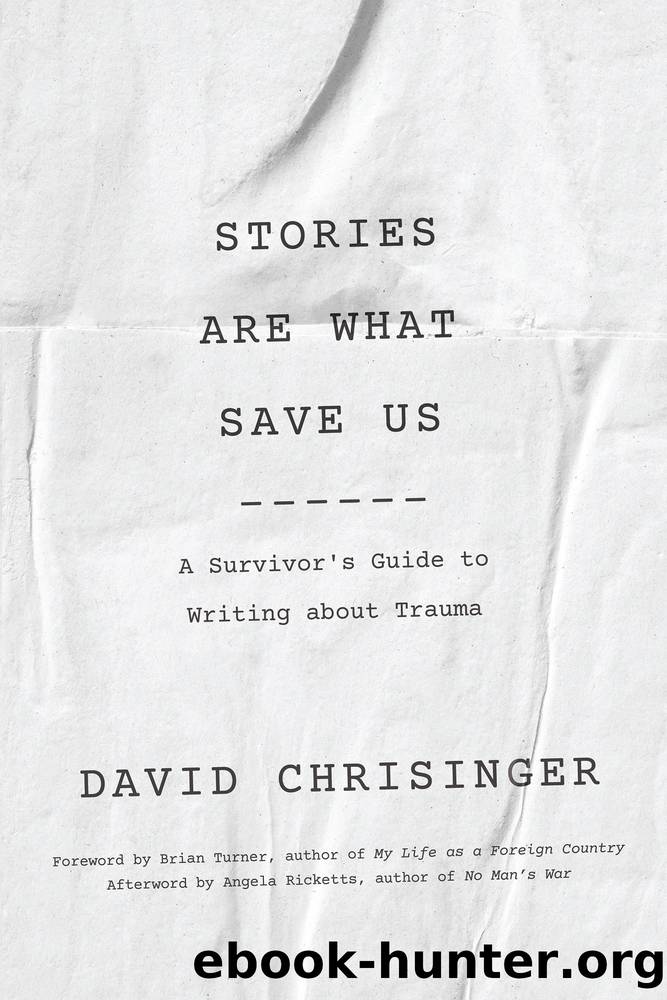Stories Are What Save Us by David Chrisinger

Author:David Chrisinger
Language: eng
Format: epub
Publisher: Johns Hopkins University Press
Published: 2021-10-15T00:00:00+00:00
The First Essential of Storytelling: The Inciting Event
The first essential of storytelling is the inciting event. The sole purpose of the inciting event is to knock the main character (you) out of their routine or upset the balance of their life in some way. An inciting event can occur in two ways: (1) either it occurs as the result of a choice that you or another character makes, or (2) itâs a coincidenceâthat is, something unexpected, random, or accidental happens. In other words, something spurs you to act and begin your transformation. It can sometimes help to think about your object of desire and make your inciting event the moment you decided thatâs what you wanted.
In this chapterâs story about Brett, I chose to throw a going-away party for him before he left for boot camp. Although I donât think I articulated it this way at the time, I was losing a friendâor at least a version of a friend. Part of me had to have known that Brett would be a different person the next time I saw him. How could he not be? I also knew that eventually he would be deployed and put in harmâs way. And I knew that, in the summer of 2005, it seemed like the American death toll in Iraq would never level off. I was scared for him, and I felt uncomfortably out of sync for weeks after he left. Even after I settled into my own routine at college, I had to look at my reality in a new way. I had to adjust to the discomfort I felt about Brett living the current events I would be studying in a cavernous lecture hall.
There are two primary approaches to organization you can try when writing a personal narrative that Iâve found work well. The first is a straightforward chronology. I call this the âKeep it simple, Sillyâ way of writing memoir. Thatâs what I used in this story about Brett. Before you twist yourself into knots coming up with a clever and unique way of telling your story, ask yourself whether it makes more sense simply to start at the beginningâthe time when you started wanting your object of desire.
This sort of beginning usually includes a backstory or some exposition before the real action of the story begins that shows the reader what life looked like for you before the crisis, climax, and personal transformation (i.e., resolution) occurs (not to worry, weâll get to all that). Exposition is a fancy word for facts. Itâs the information you provide that helps the reader understand the setting, biography, and description of you and your charactersâall the stuff your reader needs to know to follow and make sense of the events in your story.
I usually suggest that writers begin with a story that covers a relatively short period of time (say one to five years). Thereâs not as much ground to cover between the chronological beginning and the crisis. If, on the other hand,
Download
This site does not store any files on its server. We only index and link to content provided by other sites. Please contact the content providers to delete copyright contents if any and email us, we'll remove relevant links or contents immediately.
| Anesthesiology | Colon & Rectal |
| General Surgery | Laparoscopic & Robotic |
| Neurosurgery | Ophthalmology |
| Oral & Maxillofacial | Orthopedics |
| Otolaryngology | Plastic |
| Thoracic & Vascular | Transplants |
| Trauma |
Periodization Training for Sports by Tudor Bompa(8240)
Why We Sleep: Unlocking the Power of Sleep and Dreams by Matthew Walker(6688)
Paper Towns by Green John(5168)
The Immortal Life of Henrietta Lacks by Rebecca Skloot(4569)
The Sports Rules Book by Human Kinetics(4374)
Dynamic Alignment Through Imagery by Eric Franklin(4201)
ACSM's Complete Guide to Fitness & Health by ACSM(4044)
Kaplan MCAT Organic Chemistry Review: Created for MCAT 2015 (Kaplan Test Prep) by Kaplan(3994)
Livewired by David Eagleman(3757)
Introduction to Kinesiology by Shirl J. Hoffman(3755)
The Death of the Heart by Elizabeth Bowen(3599)
The River of Consciousness by Oliver Sacks(3590)
Alchemy and Alchemists by C. J. S. Thompson(3506)
Bad Pharma by Ben Goldacre(3415)
Descartes' Error by Antonio Damasio(3264)
The Emperor of All Maladies: A Biography of Cancer by Siddhartha Mukherjee(3135)
The Gene: An Intimate History by Siddhartha Mukherjee(3087)
The Fate of Rome: Climate, Disease, and the End of an Empire (The Princeton History of the Ancient World) by Kyle Harper(3051)
Kaplan MCAT Behavioral Sciences Review: Created for MCAT 2015 (Kaplan Test Prep) by Kaplan(2974)
